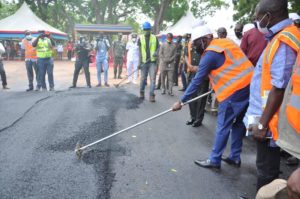Infrastructure and unemployment are the topmost concerns of Ghanaians – CDD Survey
 Ghana Centre for Democratic Development’s (CDD-Ghana) latest pre-election survey have shown infrastructure and unemployment as the topmost concerns of Ghanaians.
Ghana Centre for Democratic Development’s (CDD-Ghana) latest pre-election survey have shown infrastructure and unemployment as the topmost concerns of Ghanaians.
According to the survey conducted from September 28 to October 16, 2020, 52 per cent of the respondents were satisfied with the Government’s handling of the topmost concerns while 46 per cent of the respondents disagreed.
Dr Edem Selormey, Director of Research at CDD-Ghana, who presented the findings of the survey in Accra, said the Government got all-round positive performance ratings in social goods delivery.
She said the social goods covered the prevention of the spread of the COVID-19 pandemic, providing a reliable supply of electricity, addressing educational needs, providing water and sanitation services, improving basic health service, reducing crime, maintaining roads and bridges, and ensuring everyone had enough to eat.
With a sample size of 2,400, respondents were randomly selected across the country and the survey was conducted using face-to-face interviews in the language of the respondent’s choice (a standard English questionnaire was translated into Twi, Ewe, Ga, Dagbani and Dagaare).
Initiated in 2016, the CDD-Ghana pre-election survey was aimed at picking early warning signals by tracking citizens’ opinion on the overall level of the country’s preparedness for elections; public confidence in the competence, integrity and neutrality of the election-relevant state and quasi-state bodies; and voter behaviour, expectations, priorities and potential turn-out.
With funding support from the United States Agency for International Development (USAID), the survey also helps isolate and identify voter concerns regarding election security, physical intimidation, violence, and perceived peacefulness of the political environment.
Dr Selormey noted that the survey revealed, COVID-19 had significantly worsened the already difficult economic circumstances of many Ghanaians but they, nonetheless, remained cautiously optimistic about the future.
She said Ghanaians were split on the direction of the country.
While 47 per cent said the country was going in the right direction, the same proportion held that the country was headed in the wrong direction.
The Director of Research, touching on Ghanaian attitude towards elections, stated that the Ghanaian commitment to the ballot box remained strong and anchored in the belief that their votes would make a difference.
Dr Selormey said the respondents expressed an equally strong commitment to the rule of law, and peaceful means, mainly the use of the courts instead of violence to resolve election disputes.
“They put a very high premium on peaceful elections, strongly abhor election violence, and would like to see perpetrators of election violence given jail sentences,” she added.
Dr Kojo Asante, the Director of Advocacy and Policy Engagement at CDD-Ghana, said 44 per cent of the respondents indicated that even if the results were collated, the right one would not be announced, and these sentiments showed in the 2016 survey which was about 23 per cent.
He said this implied there was a lack of understanding of the electoral process and the transparency around it, and that was a signal to the National Commission for Civic Education and the Electoral Commission.
“That the results collation, results transmission and announcement needed a lot of education so people can understand the process,” he stated.
Source: GNA
